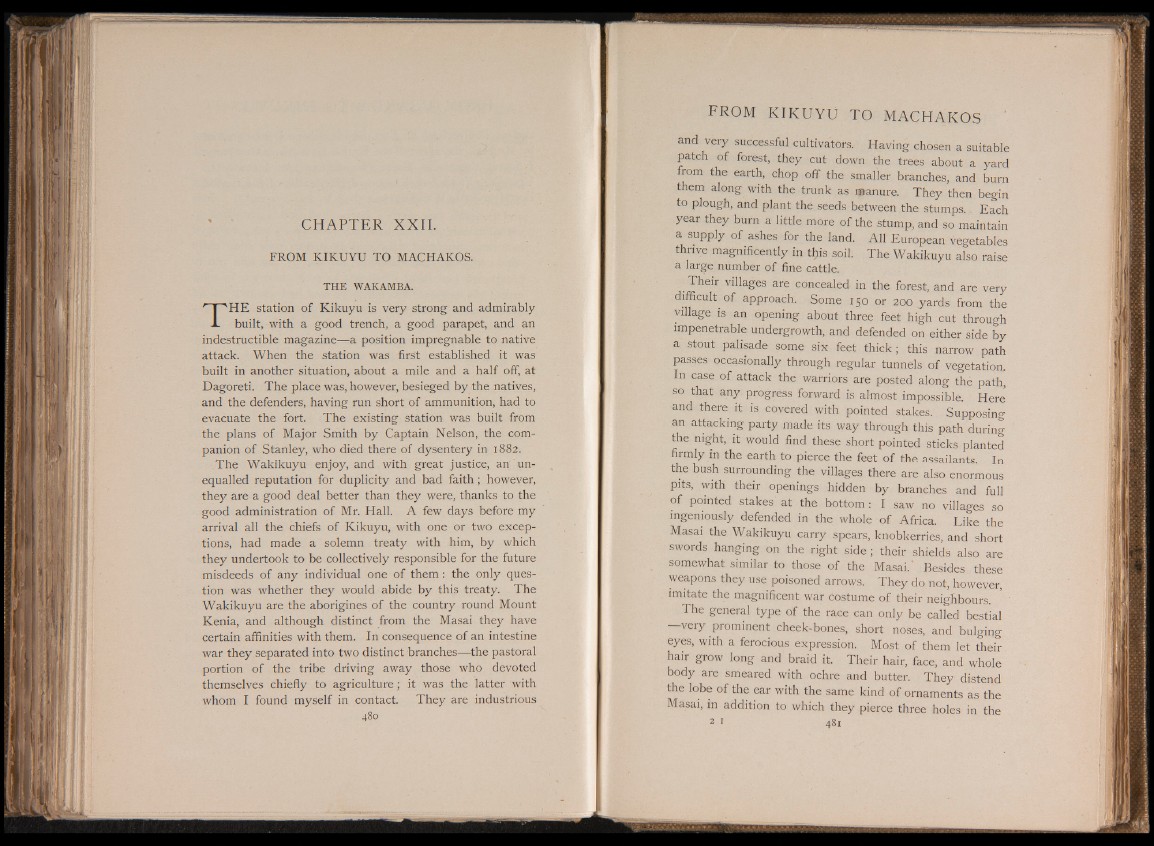
C H A P T E R X X I I .
FROM KIKUYU TO MACHAKOS.
THE WAKAMBA.
' I 'H E station of Kikuyu is very strong and admirably
i- built, with a good trench, a good parapet, and an
indestructible magazine—a position impregnable to native
attack. When the station was first established it was
built in another situation, about a mile and a half off, at
Dagoreti. The place was, however, besieged by the natives,
and the defenders, having run short of ammunition, had to
evacuate the fort. The existing station was built from
the plans of Major Smith by Captain Nelson, the companion
of Stanley, who died there of dysentery in 1882.
The Wakikuyu enjoy, and with great justice, an unequalled
reputation for duplicity and bad faith; however,
they are a good deal better than they were, thanks to the
good administration of Mr. Hall. A few days before my
arrival all the chiefs of Kikuyu, with one or two exceptions,
had made a solemn treaty with him, by which
they undertook to be collectively responsible for the future
misdeeds of any individual one of them: the only question
was whether they would abide by this treaty. The
Wakikuyu are the aborigines of the country round Mount
Kenia, and although distinct from the Masai they have
certain affinities with them. In consequence of an intestine
war they separated into two distinct branches—the pastoral
portion of the tribe driving away those who devoted
themselves chiefly to agriculture; it was the latter with
whom I found myself in contact. They are industrious
480
F ROM K I K U Y U TO M A C H A K O S
and very successful cultivators. Having chosen a suitable
patch of forest, they cut down the trees about a yard
from the earth, chop off the smaller branches, and burn
them along with the trunk as manure. They then begin
to plough, and plant the seeds between the stumps.. Each
year they burn a little more of the stump, and so maintain
a supply of ashes for the land. All European vegetables
thrive magnificently in this soil. The Wakikuyu also raise
a large number of fine cattle.
Their villages are concealed in the forest, and are very
difficult of approach. Some 150 or 200 yards from the
village is an opening about three feet high cut through
impenetrable undergrowth, and defended on either side by
a stout palisade some six feet thick; this narrow path
passes occasionally through regular tunnels of vegetation.
In case of attack the warriors are posted along thé path,
so that any progress forward is almost impossible. Here
and there it is covered with pointed stakes. Supposing
an attacking party made its way through this path during
the night, it would find these short pointed sticks planted
firmly in the earth to pierce the feet of the assailants. In
the bush surrounding the villages there are also enormous
pits, with their openings hidden by branches and full
of pointed stakes at the bottom : I saw no villages so
ingeniously defended in the whole of Africa. Like the
Masai the Wakikuyu carry spears, knobkerries, and short
swords hanging on the right side ; their shields also are
somewhat similar to those of the Masai.' Besides these
weapons they use poisoned arrows. They do not, however,
imitate the magnificent war costume of their neighbours.
The general type of the race can only be called bestial
—very prominent cheek-bones, short noses, and bulging
eyes, with a ferocious expression. Most of them let their
hair grow long and braid it. Their hair, face, and whole
body are smeared with ochre and butter. They distend
the lobe of the ear with the same kind of ornaments as the
Masai, in addition to which they pierce three holes in the
2 1 481